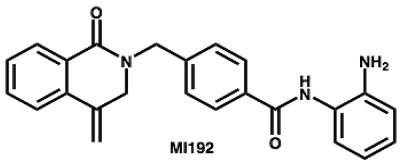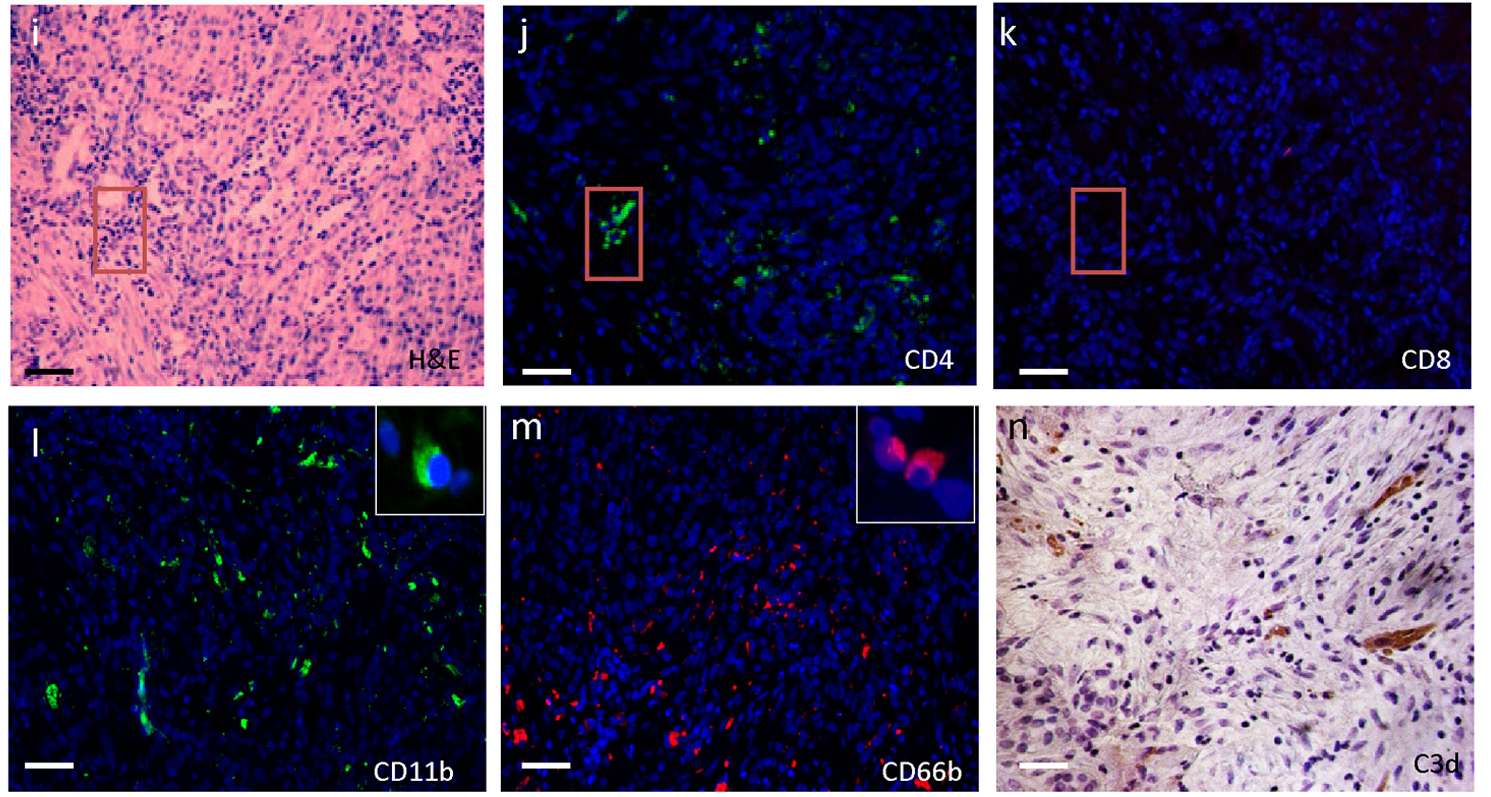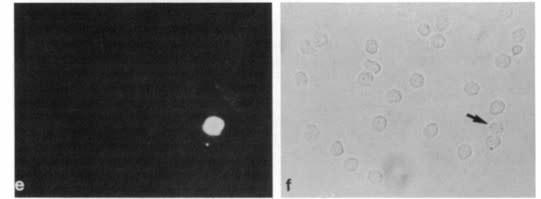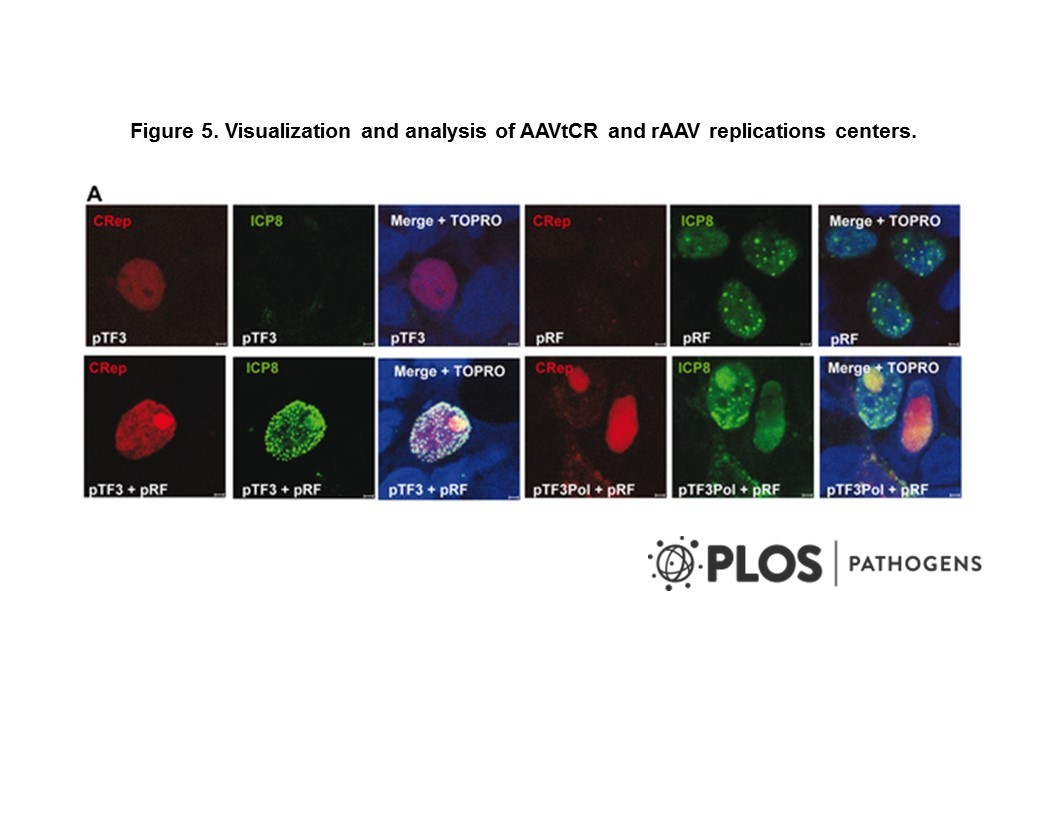Cat. #152433
HDAC2/3 inhibitor MI-192 Small Molecule (Tool Compound)
Cat. #: 152433
Sub-type: Inhibitor
Availability: Please enquire for quantities and pricing
Application: Promotes apoptosis of leukemia cell lines in vitro. Also attenuates IL-6 production in rheumatoid arthritis PBMCs in vitro. MI-192 (CRT0163458) shows potent activity in a number of cell lines tested using the NCI-60 cell panel. MI-192 was tested using the following NCI-60 cell lines: Leukemia cell lines: CCRF-CEM, HL-60 (TB), K-562, MOLT-4 and RPMI-8226. Colon Cancer cell lines: COLO205, HCC-2998, HCT-116, HCT-15, HT29, KM12 and SW-620. CNS Cancer cell lines: SF-268, SF-295, SF-539, SNB-19, ...
This fee is applicable only for non-profit organisations. If you are a for-profit organisation or a researcher working on commercially-sponsored academic research, you will need to contact our licensing team for a commercial use license.
Contributor
Inventor: Ron Grigg
Institute: University of Leeds
Tool Details
*FOR RESEARCH USE ONLY (for other uses, please contact the licensing team)
- Tool name: HDAC2/3 inhibitor MI-192 Small Molecule (Tool Compound)
- Research fields: Apoptosis and autophagy
- Molecular formula: C24H21N3O2.HCl
- Tool sub type: Inhibitor
- Primary target: HDAC2/3
- Description: MI-192 is a novel benzamide-based compound with marked selectivity for the class I enzymes, HDAC2 (histone-deacetylase 2) and HDAC3 (histone-deacetylase 3). MI-192 is also a histone-deacetylase (HDAC)-3 selective inhibitor. MI-192 might have potential in the treatment of rheumatoid arthritis, and HDAC-selective inhibition may improve the therapeutic margin of safety. Studies in various cancer cell lines have also revealed that MI-192 might be a potential therapeutic agent for use in leukaemia.
- Application: Promotes apoptosis of leukemia cell lines in vitro. Also attenuates IL-6 production in rheumatoid arthritis PBMCs in vitro. MI-192 (CRT0163458) shows potent activity in a number of cell lines tested using the NCI-60 cell panel. MI-192 was tested using the following NCI-60 cell lines: Leukemia cell lines: CCRF-CEM, HL-60 (TB), K-562, MOLT-4 and RPMI-8226. Colon Cancer cell lines: COLO205, HCC-2998, HCT-116, HCT-15, HT29, KM12 and SW-620. CNS Cancer cell lines: SF-268, SF-295, SF-539, SNB-19, ...
- Purpose: Inhibitor
- Selectivity: Exhibits >250-fold selectivity for HDAC2/3 over other HDAC isoforms.
- Iupac: N-(2-Amino-phenyl)-4-(4-methylene-1-oxo-3,4-dihydro-1H-isoquinolin-2-ylmethyl)-benzamide.
- Molecular weight: 419.91
- Solubility: DMSO
Handling
- Purity: 419.91 g/mol
- Storage conditions: Ambient
- Shipping conditions: Dry Ice
Target Details
- Primary target: HDAC2/3
- Ic50: Potent and selective HDAC2/3 inhibitor (IC50 values are 16 and 30 nM, respectively)
Application Details
- Application: Promotes apoptosis of leukemia cell lines in vitro. Also attenuates IL-6 production in rheumatoid arthritis PBMCs in vitro. MI-192 (CRT0163458) shows potent activity in a number of cell lines tested using the NCI-60 cell panel. MI-192 was tested using the following NCI-60 cell lines: Leukemia cell lines: CCRF-CEM, HL-60 (TB), K-562, MOLT-4 and RPMI-8226. Colon Cancer cell lines: COLO205, HCC-2998, HCT-116, HCT-15, HT29, KM12 and SW-620. CNS Cancer cell lines: SF-268, SF-295, SF-539, SNB-19, ...
References
- WO2013005049 PMID: 22818799


![Anti-CAR Whitlow Linker [1C3C3]](https://cancertools.org/wp-content/uploads/Figure-6-Kimble-et-al.-J-Immunother-Cancer-2025-300x322.jpg 300w, https://cancertools.org/wp-content/uploads/Figure-6-Kimble-et-al.-J-Immunother-Cancer-2025-280x300.jpg 280w, https://cancertools.org/wp-content/uploads/Figure-6-Kimble-et-al.-J-Immunother-Cancer-2025-954x1024.jpg 954w, https://cancertools.org/wp-content/uploads/Figure-6-Kimble-et-al.-J-Immunother-Cancer-2025-768x824.jpg 768w, https://cancertools.org/wp-content/uploads/Figure-6-Kimble-et-al.-J-Immunother-Cancer-2025.jpg 1193w)

![Anti-CAR Whitlow Linker [1B4A1]](https://cancertools.org/wp-content/uploads/Figure-5-Kimble-et-al.-J-Immunother-Cancer-2025-300x396.jpg 300w, https://cancertools.org/wp-content/uploads/Figure-5-Kimble-et-al.-J-Immunother-Cancer-2025-227x300.jpg 227w, https://cancertools.org/wp-content/uploads/Figure-5-Kimble-et-al.-J-Immunother-Cancer-2025-776x1024.jpg 776w, https://cancertools.org/wp-content/uploads/Figure-5-Kimble-et-al.-J-Immunother-Cancer-2025-768x1013.jpg 768w, https://cancertools.org/wp-content/uploads/Figure-5-Kimble-et-al.-J-Immunother-Cancer-2025.jpg 970w)




